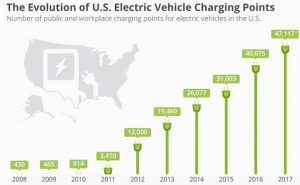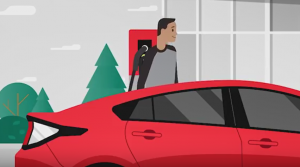Five electric car myths shattered
Discover why it’s a great time to drive electric

In the past, many people thought of electric cars as a tech toy reserved only for the well-to-do, environmentally conscious crowd. But the landscape has changed. A growing number of more affordable electric car options have opened the door to driving electric for many people. So the more you know about today’s electric vehicles, the smarter decision you can make about your driving choices, and there are lots of options. At last count, there are nearly 40 models from roughly 19 automobile brands available.
Correcting some common myths about electric cars
Myth 1: They can’t go the distance
The popular notion is, “I’ll run out of power somewhere remote or dangerous like in the middle of a busy interstate.” It’s called range anxiety, and it reflects the new way of using batteries instead of the gas tank.
Putting this myth to rest is the fact that batteries keep improving. Today the average EV is going greater distances than ever before. For example, the 2017 Chevrolet Bolt1 introduced in late 2016 broke out of the under 100-mile range pack of most EVs to date by offering a 238 all-electric range.
Read our article, The Very Basics of EV Charging.
Myth 2: There’s no place to charge

Electric car The U.S. Department of Energy Office of Energy Efficiency & Renewable Energy3 reports that as of November 2017, there are 48,000 charging stations across the U.S. About 590 were in Minnesota and more than 1,200 in Colorado, so there are plenty of places to charge on the go.
See our related article Tips for an EV Roadtrip
Remember, 80 percent of electric car charging takes place at home4, often with a 120-volt outlet – the kind you’d plug a lamp or TV into. Want a quicker charge? Install a Level 2 charger with a 240-volt outlet. That’s the kind of power your electric clothes dryer requires. Most Americans drive an average of 37 miles a day, well within the range of most EVs. Even with an extreme 70-mile round trip commute, it’s unlikely you’ll need to charge remotely.
Myth 3: They’re too expensive
The major price factor for electric cars is the battery pack. As battery production scales up to higher volume, prices tend to drop. And we’re seeing electric cars become more affordable. For example, the new 2018 Nissan Leaf (the newer body style) is actually priced at nearly $700 less than the 2017 model5.
Another encouraging sign is that utilities like Xcel Energy have special EV pricing plans that help customers save money by charging their electric cars overnight.
Myth 4: They’re too small
The early electric cars were smaller vehicles, but newer models are offering more spacious options. No, pickups and full-size SUVs are not part of those lineups yet. Currently, the closest option is the Model X from Tesla, which is considered a small SUV. But they’re on the way– pickups and full-size SUVs are in the works.

Myth 5: They burn coal
The electricity you use to charge your electric car is getting cleaner each year. Xcel Energy is a national leader in decreasing carbon emissions, with ambitious plans6 to reach a 60 percent reduction in carbon emissions by 2030, compared to 2005 levels. So electric cars in Xcel Energy service areas can run cleaner each year as our energy mix continues to add more renewables and other carbon-free sources.
Want to run even cleaner? Our Windsource® program7 lets you use more renewable energy for your home or business. You can purchase a small block or even 100% of your electricity from a renewable source. Here’s a link to the details.
The real reasons drivers choose an electric car
1. Environmental benefits
A traditional car engine emits8 carbon monoxide, hydrocarbons, nitrous oxides, carbon dioxide, and particulates. Electric car drivers recognize that reducing these is a good thing, especially in urban areas.
2. The love of new tech
How would you like to use your smartphone to warm up your electric car in the winter, use your brakes to generate more battery power or program your EV to charge up during low demand times when electricity is cheaper? These are just a few of the technical advancements, with more on the way!
3. The financial savings
Research that shows9 electric cars can perform at a cost equivalent to about one dollar per gallon of gasoline. With current U.S. gas prices trending up10 the last three years and currently ranging from $2.50 to nearly $4 a gallon, it’s a notable difference. And because EVs have fewer moving parts, not as many fluids to change and regenerative brakes that collect energy, they can be at least 30 percent less expensive to maintain.

Watch our video about electric vehicles and renewable energy
Schedule a test drive soon!
- https://en.wikipedia.org/wiki/Chevrolet_Bolt
- https://blogs-images.forbes.com/niallmccarthy/files/2018/04/20180409_Charging_Points.jpg
- https://insideevs.com/number-of-charging-stations-in-u-s-increased-to-48000-15000-in-california/
- https://www.energy.gov/eere/electricvehicles/charging-home
- https://www.dickhannahnissan.com/auto-blog/change-good-thing-2018-nissan-leaf-vs-2017-nissan-leaf
- https://www.xcelenergy.com/company/corporate_responsibility_report/2017_highlights
- https://www.xcelenergy.com/programs_and_rebates/residential_programs_and_rebates/renewable_energy_options_residential/windsource_for_residences
- http://www.uvm.edu/~empact/air/cars.php3#pollutants
- https://www.energy.gov/articles/egallon-how-much-cheaper-it-drive-electricity
- http://www.gaspricewatch.com/web_us_average_gas_price_chart.php?period=3year


